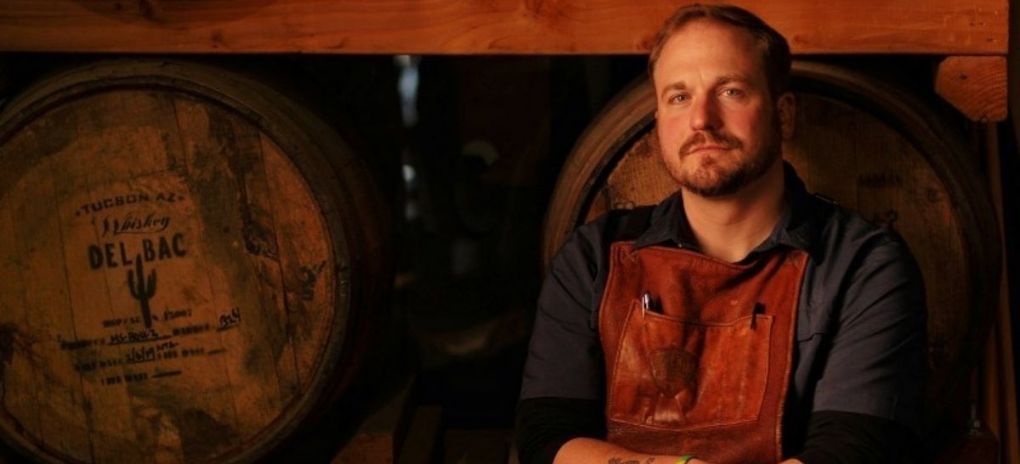
12/09/2022 The award-winning distiller, creating some of the finest craft spirits in the United States, Mark A. Vierthaler describes the art of distilling, his take on the three-tier system, and the role of a distiller in marketing their spirits.
Mark A. Vierthaler is the Head Distiller at Whiskey Del Bac, an award-winning single malt produced in Tucson, Arizona. Starting his journey in Journalism, Vierthaler has worked as an editor, freelance writer, Public Relations, Marketing and had created several Bar Programs before joining the distillation industry. He started his career at Boot Hill Distillery in Dodge City, Kansas as a Distiller moved on to Director of Marketing then joined Tenth Ward Distilling Co. as a Head Distiller, before being appointed as Head Distiller at Hamilton Distillers Group in 2021. He has been recognized with multiple awards for his work and has helped expand the distillery's portfolio by his attention to detail and creativity. Over the years he has established himself as a leader in the American Craft Distillation industry and currently sits on the Education Committee and Guild Committee for the American Craft Spirits Association.
[[relatedPurchasesItems-31]]
Tell us a little about yourself? Having a background in Journalism, what inspired you to join the beverage distillation industry?
The running joke that I always like to make is that journalists like to drink, so it only makes sense that a journalist would learn how to become a distiller. Like a lot of other craft distillers, I essentially fell into the business. My wife and I are huge foodies – we’ve always loved to cook, and we’ve always loved to mix cocktails. After I left journalism to begin working in public relations and marketing, I kept freelance writing – specifically covering craft spirits and the burgeoning cocktail renaissance that was beginning to make its way from the coasts into middle America.
My wife and I had the opportunity to establish a beverage program at a local theater company where we were living at the time and spent the decade slowly introducing more and more craft spirits and craft cocktails into our community.
After several years of writing about spirits and cocktails while managing the theater bar program, three area farmers got together and founded Boot Hill Distillery – a craft distillery in Dodge City, Kansas focused on using grain grown on their own farms to produce what we called “soil to sip” spirits. I saw what I felt was a huge opportunity and walked away from my public relations job to learn how to become a distiller. After all - what better way to expand my love of crafting amazing drinks than to be able to make the spirit itself?
Being the Head Distiller at Hamilton Distiller Group, what does your day look like?
A typical day begins with me getting into the distillery between 6 and 6:30 each morning. This gives me a chance to run checks on all of the equipment and do any walkthroughs of long-running projects before our production staff arrives. I'll make a pot of coffee for the team, hash out our plans for the day, and get all of the day-to-day distillation operations started so everything can be humming by the time the crew arrives.
I call it my church time - A bit of meditation to focus exclusively on the whiskey before the sound and fury of production begins.
Our production team arrives at 7 a.m. to take over the usual production for the day. I count myself lucky to have one of (if not the) best production teams in the business.
Our Lead Distiller Dustin Cox oversees our two production distillers: Abbey Fife and Raymond Hammond. The three of them then handle most of the day-to-day production responsibilities for the rest of the day. I chip in and help out whenever I can.
The majority of my day is spent on things like paperwork and reporting, check-ins with our department heads here at Whiskey Del Bac, long-term planning meetings, virtual meetings with the various boards that I sit on, final approval of finished products, etc.
For me it's the best of both worlds: I still get to have my hands directly involved in production so I intimately know what's going on in the still room, and can help address any challenges or changes facing the production team.
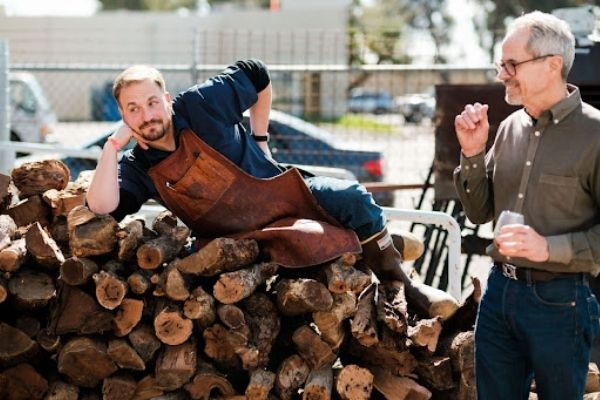
Mark A. Vierthaler with Co-Founder Stephen Paul
According to you, what makes a spirit great? Where do you draw inspiration from while making new spirits?
The simple answer: Does it taste good? Then that's a great spirit.
The more nuanced answer is that there are a handful of things that create a "great" spirit.
Does this fit within the generally agreed-upon standards of the category?
Is it a whiskey with "whiskey-like" characteristics? Is there an appreciable Juniper note in gin? etc.
Does it have something that makes it unique?
I'll admit I'm a sucker for distilleries that lean into their local terroir - As long as it works. I've had some spirits that lean on local botanicals or woods but end up being unpleasant and unbalanced because more thought went into making the spirit clever than making it taste good.
A producer doesn't have to reinvent the wheel, but what can they do to make it tasty in their own way? Is it balanced? Is there too much ethanol burn? Can I taste an inordinate amount of flaws from the fermentation? From poor cuts? From improper filtration or finishing? Is it ethically produced?
The very nature of distillation is incredibly wasteful - We use insane amounts of water. We utilize what could be a food source to create a recreational product. Each piece of the production is incredibly labor-intensive. I'll cop to a bias - whether or not the distillery producing the product I'm tasting is ethically sound does play into my definition of a "great" spirit.
What role do you think Distributors and retailers play in the development of a new spirit? How do you think they can help you to increase sales and how can you work with them to innovate and expand?
Working within the three-tier system in the United States is a massive challenge - especially for startups, but even so for more established brands like ourselves.
That means that developing mutually beneficial partnerships is key for us to survive as objective newcomers into the market. That means working with your distributor and retail partners to ensure that you're creating a product that consumers ACTUALLY want and will move when it gets to market.
It's always worth taking those with a grain of salt as well. After all, no one knows your product as well as you do. The best relationships are balancing acts between leaning on the feedback your three-tier partners receive, while also being confident in your product to create something unique.
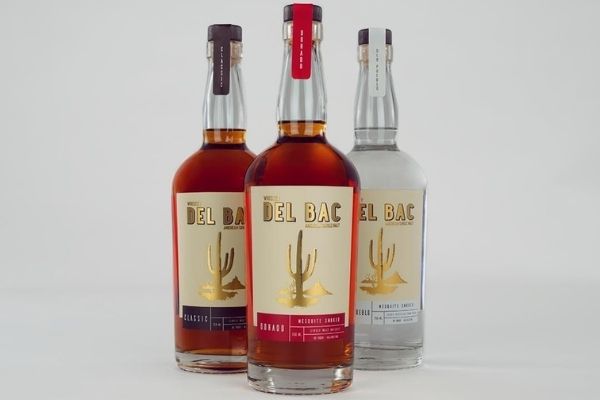
Del Bac Whiskeys
Source: Instagram / Whiskey Del Bac
Can you take us through your product line? What makes your spirits unique?
Whiskey Del Bac was created by Stephen Paul and his daughter Amanda Paul just over 10 years ago. Like a lot of great ideas, it came about over whiskey. You see, Stephen and his wife Elaine owned a furniture design and manufacturing company here in Tucson for 30 years, called Arroyo Design.
They were most famous for the mesquite furniture they made. Mesquite is a tree native to the Great American Southwest that grows in very distinctive, gnarled patterns and its grain is spectacular. It's very hard to work with though. Evenings, Stephen would bring the leftover scraps of mesquite home, where he and Elaine would barbecue with them.
One evening while enjoying a bottle of Highland Scotch, Elaine asked Stephen if anyone had thought of drying malt with mesquite since the Scots had been using peat for so long.
Stephen became obsessed with the idea, and began teaching himself to malt and distilled in the Scottish style with mesquite as the key feature. That eventually led to the creation of Hamilton Distillers Group and our flagship brand: Whiskey Del Bac.
While many other craft distilleries take the "more is more" approach, Whiskey Del Bac makes one thing and one thing very well - American Single Malt Whiskey. As far as we know, we're one of just five or six distilleries in the country that is solely devoted to making American Single Malts. It's the only thing we do.
Our three main products are our Classic - a 100% unsmoked American Single Malt; Dorado - a mix of "mesquite" (not peated) malts and unsmoked malt; and Old Pueblo - our unaged Dorado. We also malt our own barley for the mesquite whiskeys, making us one of just a handful of distilleries in the U.S. that malts their own barley.
Beginning this year we also have three seasonal releases: A Sherry Cask release in the spring, a Calvados Cask release in the summer, and a heavy mesquite single malt in the winter called Winter Release.
On top of all that we have three releases that are unique each year called our Distiller's Cut series. These are unique malt mash bills, out-of-the-ordinary product blends, and one-off finishing casks.
Each of these products is focused on creating high-quality American Single Malt whiskies that enthusiastically embrace the terroir of the American Southwest.
What are some of the recent upgrades and innovations in terms of technology in the distillery? What do you think are some of the upcoming innovative Spirits trends in the market?
I always say that people are much more intelligent than I have figured out how to make absolutely amazing spirits with much simpler technology. Obviously, you hear lots of things about rapid aging, quick infusion, sonic waves, etc. In the end, there's no tricking Mother Nature though.
What we can do is lean into Mother Nature - Pay attention to HOW we're distilling our products. Tracking HOW the desert temperature fluctuations impact our barrel extraction rates. Studying HOW increased time on copper impacts final new make taste.
For us - and I think for a lot of the industry - the technology improvements are focused more around safety and compliance. As new technology like gas chromatography becomes much more accessible, I think you'll see more and more producers utilizing high-tech tools to make our old-world products much more consistent and drinkable.
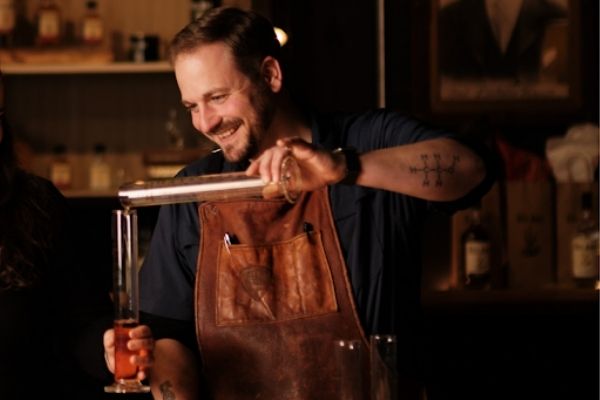
How do you focus on sustainability while making your spirits?
Whiskey Del Bac is located in the Sonoran desert, where potable water is obviously at a premium. While we're not doing as well as we'd like at the moment, every month we take a close look at our consumption rates and work on:
Reclaiming process water to reduce drawing from already limited reserves.
Utilizing less caustic and environmentally detrimental cleaning materials.
Reclaiming heating and cooling from our boiler and chiller respectively to reduce energy consumption.
Ethically sourcing our grain, yeast, bottles, labels, etc.
Like a lot of other distilleries, our spent grain from our mashes goes to a local farmer who feeds it to his pigs. Each step is a step in the right direction, but it takes time, focus, and dedication to have long-term positive impacts.
What major challenges do you happen to face while distilling your spirits? What is the one tip you would like to give someone who is looking forward to joining the beverage distillation industry?
Invest the time and money in safety. Educate your staff about safety. Educate your consumers about safety. Educate your contractors, your freelancers, and your public about safety.
Making spirits for a living is amazing. It's fun, it's inspiring, and it can kill you. Every day you distill, you create a bomb, and every day it's your job to ensure that bomb is properly diffused.
Spend the money when you can. Subpar ingredients, subpar equipment, subpar marketing - They will always come back to bite you in the ass. That doesn't mean that the most expensive thing is necessarily the best.
But, piecemealing together over time can lead to struggles with production efficiency, quality assurance, and most importantly - safety.
How do you think a distiller or blender can help in driving marketing and sales personally?
There's an encouraging trend of people recognizing the hard work, talent, and skill of people who create things with their hands. This has led to an increasing desire by consumers to want to "meet" those that make their products. By being able to share their knowledge and passion with the community that consumes their products, I think that distillers and blenders are in a unique position to help underline the authenticity of the distillery where they ply their trade. It's also an amazing opportunity to put the hard workers in the spotlight.
Whiskey Del Bac wouldn't be nearly as delicious and successful if the production crew of Dustin, Abbey, and Raymond weren't here day-in-day-out using their skills to make amazing whiskey, and their talents to ensure the quality is upheld every step of the way.
And they deserve just as much if not more recognition!
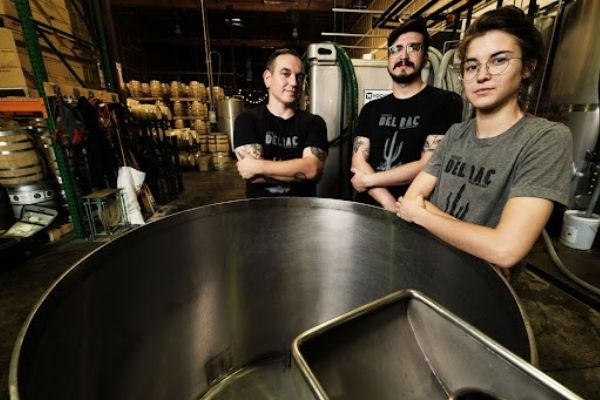
Del Bac’s production team — from left to right it is Lead Distiller Dustin Cox, Distiller Raymond Hammond, and Distiller Abbey Fife
Three essential characteristics of a good distiller?
Willingness to Fail - The head of operations at the first distillery where I cut my teeth would often say "Distilling is 75% science and 25% magic." What he meant was - Taking risks and making mistakes is how you build an amazing product and an amazing brand. But only if you're taking the time to track WHY things failed, and then pivot from there.
Keep Your Ego in Check - There's always someone out there more talented than you. More driven than you. More successful than you. I've been in the spirits industry for more than a decade - distilling for almost half of that. Every time I feel I have an "experts" grasp on something, I either meet someone with exponentially more knowledge than me. Or I spectacularly screw something up. Be confident in your abilities and know when to stand your ground. But don't ever think you know everything. That's how you stagnate as a distiller and never grow past where you are now. The day you wake up and say "I think everything is absolutely perfect" is the day to retire.
It's All About Community - This ties in with what I said above. You can have the world's best palate. You can craft the most insane spirits anyone has ever tasted. No one wants to purchase your product because you're a jerk? You're in trouble. It's rote to say it but it's true - A high tide raises all ships. That doesn't mean going out and sharing your secret recipes with everyone. It just means we were all beginners once. Be calm, be understanding, share your knowledge. When we're all better, we're ALL better.
Finally, which are some of your favorite cocktails?
There are three cocktails that I adore, that I believe truly allow the distillers' vision of the base spirit to come through. They're also incredibly simple, but so few people mix them correctly:
Old Fashioned
Especially with our Dorado. Other whiskies and brandies and aged spirits are just as good. It should have five ingredients - Base Spirit, Sweetener, Bitters, Ice, and Citrus Peel Twist. This drink evolves as the ice melts, creating three different experiences. Base spirit dominant up front, smooth sipper in the middle, dessert at the end.
Negroni
A poorly picked gin can absolutely wreck a good Negroni. Some gins swing sweet, some piney. Knowing the right gin to mix with the right sweet vermouth is a practice in artistry. Built with ice and a twist of orange peel over the top.
Sazerac
Spicy rye whiskey. Citrus bite. Earthiness herbal licorice from the absinthe. It's so complex but so absolutely brilliant.



